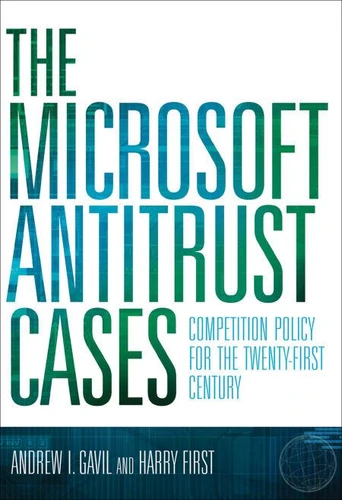The Microsoft Antitrust Cases. Competition Policy for the Twenty-first Century
Par : ,Formats :
Disponible dans votre compte client Decitre ou Furet du Nord dès validation de votre commande. Le format ePub protégé est :
- Compatible avec une lecture sur My Vivlio (smartphone, tablette, ordinateur)
- Compatible avec une lecture sur liseuses Vivlio
- Pour les liseuses autres que Vivlio, vous devez utiliser le logiciel Adobe Digital Edition. Non compatible avec la lecture sur les liseuses Kindle, Remarkable et Sony
- Non compatible avec un achat hors France métropolitaine
 , qui est-ce ?
, qui est-ce ?Notre partenaire de plateforme de lecture numérique où vous retrouverez l'ensemble de vos ebooks gratuitement
Pour en savoir plus sur nos ebooks, consultez notre aide en ligne ici
- Nombre de pages460
- FormatePub
- ISBN978-0-262-31922-5
- EAN9780262319225
- Date de parution28/11/2014
- Protection num.Adobe DRM
- Taille845 Ko
- Infos supplémentairesepub
- ÉditeurThe MIT Press
Résumé
A comprehensive account of the decades-long, multiple antitrust actions against Microsoft and an assessment of the effectiveness of antitrust law in the digital age. For more than two decades, the U. S. Department of Justice, various states, the European Commission, and many private litigants pursued antitrust actions against the tech giant Microsoft. In investigating and prosecuting Microsoft, federal and state prosecutors were playing their traditional role of reining in a corporate power intent on eliminating competition.
Seen from another perspective, however, the government's prosecution of Microsoft-in which it deployed the century-old Sherman Antitrust Act in the volatile and evolving global business environment of the digital era-was unprecedented. In this book, two experts on competition policy offer a comprehensive account of the multiple antitrust actions against Microsoft-from beginning to end-and an assessment of the effectiveness of antitrust law in the twenty-first century.
Gavil and First describe in detail the cases that the Department of Justice and the states initiated in 1998, accusing Microsoft of obstructing browser competition and perpetuating its Windows monopoly. They cover the private litigation that followed, and the European Commission cases decided in 2004 and 2009. They also consider broader issues of competition policy in the age of globalization, addressing the adequacy of today's antitrust laws, their enforcement by multiple parties around the world, and the difficulty of obtaining effective remedies-all lessons learned from the Microsoft cases.
Seen from another perspective, however, the government's prosecution of Microsoft-in which it deployed the century-old Sherman Antitrust Act in the volatile and evolving global business environment of the digital era-was unprecedented. In this book, two experts on competition policy offer a comprehensive account of the multiple antitrust actions against Microsoft-from beginning to end-and an assessment of the effectiveness of antitrust law in the twenty-first century.
Gavil and First describe in detail the cases that the Department of Justice and the states initiated in 1998, accusing Microsoft of obstructing browser competition and perpetuating its Windows monopoly. They cover the private litigation that followed, and the European Commission cases decided in 2004 and 2009. They also consider broader issues of competition policy in the age of globalization, addressing the adequacy of today's antitrust laws, their enforcement by multiple parties around the world, and the difficulty of obtaining effective remedies-all lessons learned from the Microsoft cases.
A comprehensive account of the decades-long, multiple antitrust actions against Microsoft and an assessment of the effectiveness of antitrust law in the digital age. For more than two decades, the U. S. Department of Justice, various states, the European Commission, and many private litigants pursued antitrust actions against the tech giant Microsoft. In investigating and prosecuting Microsoft, federal and state prosecutors were playing their traditional role of reining in a corporate power intent on eliminating competition.
Seen from another perspective, however, the government's prosecution of Microsoft-in which it deployed the century-old Sherman Antitrust Act in the volatile and evolving global business environment of the digital era-was unprecedented. In this book, two experts on competition policy offer a comprehensive account of the multiple antitrust actions against Microsoft-from beginning to end-and an assessment of the effectiveness of antitrust law in the twenty-first century.
Gavil and First describe in detail the cases that the Department of Justice and the states initiated in 1998, accusing Microsoft of obstructing browser competition and perpetuating its Windows monopoly. They cover the private litigation that followed, and the European Commission cases decided in 2004 and 2009. They also consider broader issues of competition policy in the age of globalization, addressing the adequacy of today's antitrust laws, their enforcement by multiple parties around the world, and the difficulty of obtaining effective remedies-all lessons learned from the Microsoft cases.
Seen from another perspective, however, the government's prosecution of Microsoft-in which it deployed the century-old Sherman Antitrust Act in the volatile and evolving global business environment of the digital era-was unprecedented. In this book, two experts on competition policy offer a comprehensive account of the multiple antitrust actions against Microsoft-from beginning to end-and an assessment of the effectiveness of antitrust law in the twenty-first century.
Gavil and First describe in detail the cases that the Department of Justice and the states initiated in 1998, accusing Microsoft of obstructing browser competition and perpetuating its Windows monopoly. They cover the private litigation that followed, and the European Commission cases decided in 2004 and 2009. They also consider broader issues of competition policy in the age of globalization, addressing the adequacy of today's antitrust laws, their enforcement by multiple parties around the world, and the difficulty of obtaining effective remedies-all lessons learned from the Microsoft cases.



